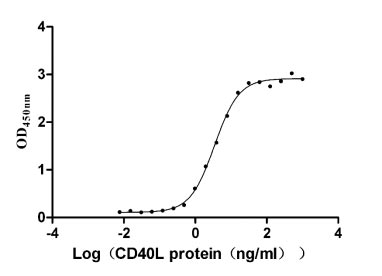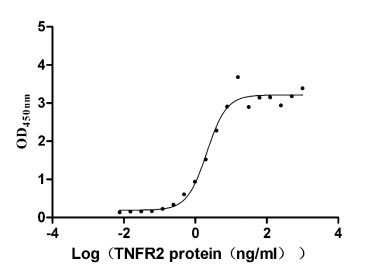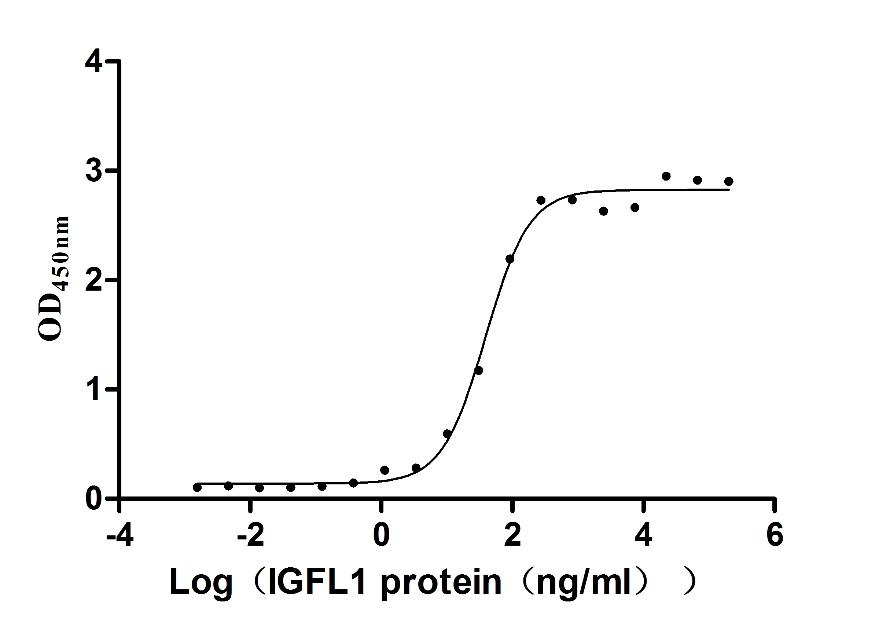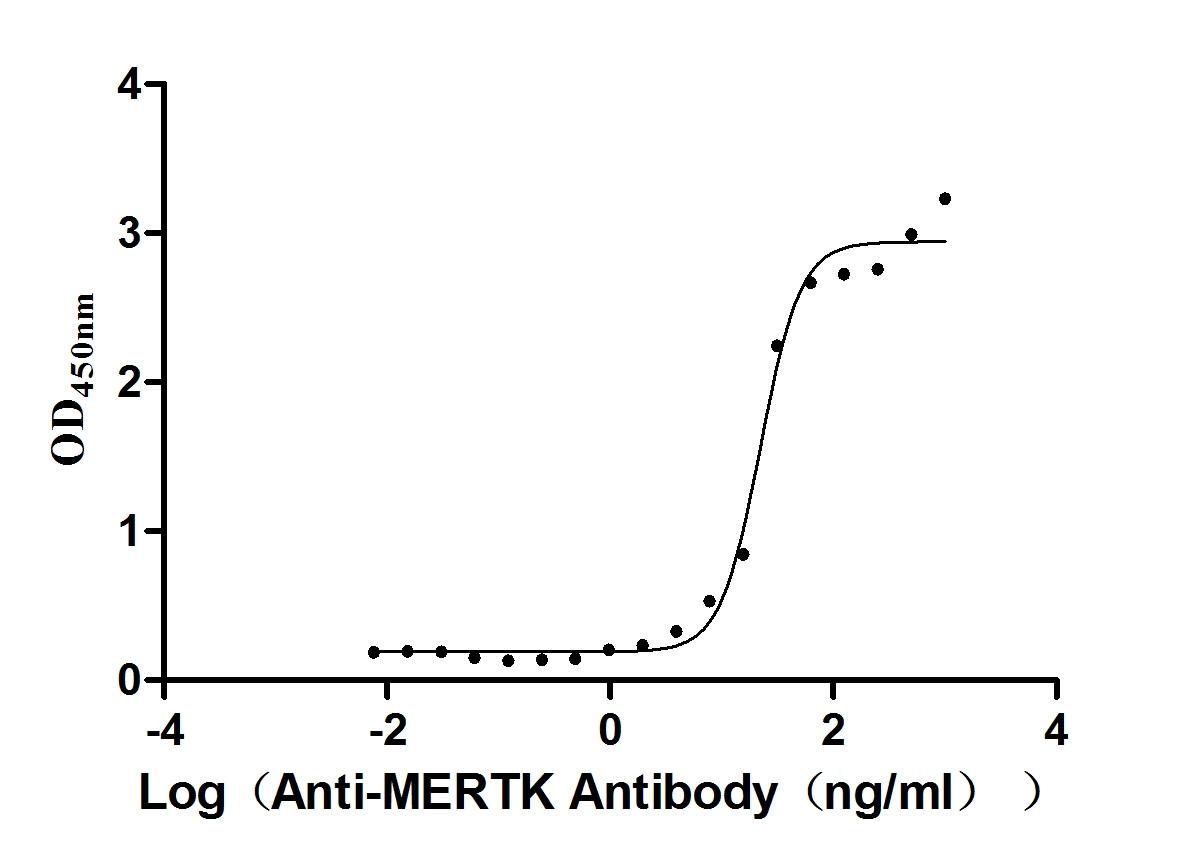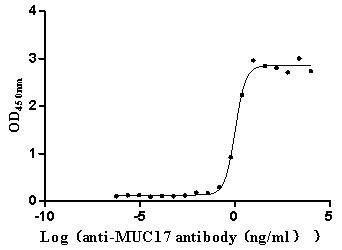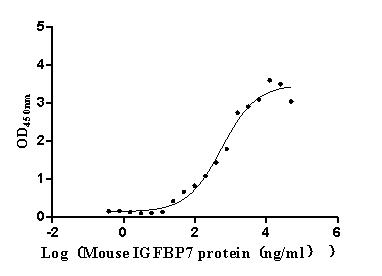Recombinant Human Protein BTG1 (BTG1)
-
货号:CSB-YP002863HU
-
规格:
-
来源:Yeast
-
其他:
-
货号:CSB-EP002863HU
-
规格:
-
来源:E.coli
-
其他:
-
货号:CSB-EP002863HU-B
-
规格:
-
来源:E.coli
-
共轭:Avi-tag Biotinylated
E. coli biotin ligase (BirA) is highly specific in covalently attaching biotin to the 15 amino acid AviTag peptide. This recombinant protein was biotinylated in vivo by AviTag-BirA technology, which method is BriA catalyzes amide linkage between the biotin and the specific lysine of the AviTag.
-
其他:
-
货号:CSB-BP002863HU
-
规格:
-
来源:Baculovirus
-
其他:
-
货号:CSB-MP002863HU
-
规格:
-
来源:Mammalian cell
-
其他:
产品详情
-
纯度:>85% (SDS-PAGE)
-
基因名:
-
Uniprot No.:
-
别名:BTG1Protein BTG1; B-cell translocation gene 1 protein
-
种属:Homo sapiens (Human)
-
蛋白长度:Full length protein
-
表达区域:1-171
-
氨基酸序列MHPFYTRAAT MIGEIAAAVS FISKFLRTKG LTSERQLQTF SQSLQELLAE HYKHHWFPEK PCKGSGYRCI RINHKMDPLI GQAAQRIGLS SQELFRLLPS ELTLWVDPYE VSYRIGEDGS ICVLYEASPA GGSTQNSTNV QMVDSRISCK EELLLGRTSP SKNYNMMTVS G
-
蛋白标签:Tag type will be determined during the manufacturing process.
The tag type will be determined during production process. If you have specified tag type, please tell us and we will develop the specified tag preferentially. -
产品提供形式:Lyophilized powder
Note: We will preferentially ship the format that we have in stock, however, if you have any special requirement for the format, please remark your requirement when placing the order, we will prepare according to your demand. -
复溶:We recommend that this vial be briefly centrifuged prior to opening to bring the contents to the bottom. Please reconstitute protein in deionized sterile water to a concentration of 0.1-1.0 mg/mL.We recommend to add 5-50% of glycerol (final concentration) and aliquot for long-term storage at -20℃/-80℃. Our default final concentration of glycerol is 50%. Customers could use it as reference.
-
储存条件:Store at -20°C/-80°C upon receipt, aliquoting is necessary for mutiple use. Avoid repeated freeze-thaw cycles.
-
保质期:The shelf life is related to many factors, storage state, buffer ingredients, storage temperature and the stability of the protein itself.
Generally, the shelf life of liquid form is 6 months at -20°C/-80°C. The shelf life of lyophilized form is 12 months at -20°C/-80°C. -
货期:Delivery time may differ from different purchasing way or location, please kindly consult your local distributors for specific delivery time.Note: All of our proteins are default shipped with normal blue ice packs, if you request to ship with dry ice, please communicate with us in advance and extra fees will be charged.
-
注意事项:Repeated freezing and thawing is not recommended. Store working aliquots at 4°C for up to one week.
-
Datasheet :Please contact us to get it.
相关产品
靶点详情
-
功能:Anti-proliferative protein.
-
基因功能参考文献:
- This study demonstrated for the first time that lower expression of BTG1 correlated with poor survival in PDAC patients, which suggests that BTG1 expression may serve as an available prognostic biomarker in the future PMID: 29076521
- BTG1 expression is lowered in colorectal cancer cells. Forced BTG1 expression reverses aggressive phenotypes in colorectal cancers. PMID: 27447746
- BTG1 down-regulation in colorectal cancer occurs through epigenetic repression, which is involved in the development and progression of colorectal cancer. PMID: 29374692
- BTG1 gene deletion is associated with acute lymphoblastic leukemia. PMID: 28033648
- our results identify BTG1 as a tumor suppressor in leukemia that, when deleted, strongly enhances the risk of relapse in IKZF1-deleted B-cell precursor acute lymphoblastic leukemia, and augments the glucocorticoid resistance phenotype mediated by the loss of IKZF1 function. PMID: 27979924
- BTG1 interacts with ATF4 and positively modulates its activity by recruiting the protein arginine methyl transferase PRMT1 to methylate ATF4 on arginine residue 239. PMID: 26657730
- our data suggest that BTG1 overexpression combined with radiation therapy increases the therapeutic efficacy of breast cancer treatment via regulation of the cell cycle and apoptosis-related signaling pathways. PMID: 26503430
- Suggest that down-regulated BTG1 expression might promote gastric carcinogenesis partially due to its promoter methylation. BTG1 overexpression might reverse the aggressive phenotypes. PMID: 26050197
- Reduced BTG1 expression is associated with increased nasopharyngeal cancer severity, suggesting it is a negative regulator of the cancer and can serve as a prognostic indicator. Reduced BTG1 expression is possibly associated with tumour metastasis. PMID: 24985971
- Our results indicate that altered BTG1 expression might affect hepatocarcinogenesis and may represent a novel biomarker for HCC carcinogenesis and progression. PMID: 25405901
- Data indicate that microRNA-19a regulates prostate cancer cells by directly targeting B cell translocation gene-1 protein BTG1. PMID: 25936765
- Altered expression of BTG1 is a potential biomarker for carcinogenesis and progression of gastric cancer, particularly for proximal nondiffuse and diffuse GC. PMID: 25487193
- Results show that reduced BTG1 expression is associated with increased disease severity, suggesting it as negative regulator of thyroid cancer. PMID: 25017022
- Down-regulation of BTG1 by miR-454-3p renders tumor cells sensitive to radiation. PMID: 25115181
- BTG1 protein levels were significantly reduced in hepatocellular cancer and were associated with lymph node metastasis, clinical stage, cell differentiation, and prognosis. PMID: 25173640
- Bcell translocation 1 gene inhibits cellular metastasisassociated behavior in breast cancer. PMID: 24714932
- Reduced BTG1 expression is associated with increased disease severity, suggesting it is a negative regulator of esophageal cancer PMID: 24969561
- BTG1 deletions might play a role in leukemogenesis of B-cell precursor acute lymphoblastic leukemia as well as of BCR-ABL1-positive mixed-phenotype acute leukemia and chronic myeloid leukemia in B-lineage blast crisis (B-lineage). PMID: 24998463
- BTG1 may play important roles as a negative regulator to breast cancer cell. PMID: 24272202
- BTG1 expression decreased in nonsmall cell lung cancer and correlated significantly with lymph node metastasis; clinical stage; histological grade; poor overall survival PMID: 24264312
- Altered BTG1 expression might play a role in the pathogenesis. PMID: 24084718
- These results indicate that BTG1 may be used as a novel therapeutic target for human breast cancer treatment. PMID: 23982470
- BTG1 deletions are not associated with down syndrome acute lymphoblastic leukemia PMID: 22868968
- BTG1 loss is a novel finding in acute lymphoblastic leukemia in children with down syndrome PMID: 22072402
- BTG1 regulates glucocorticoid receptor autoinduction in acute lymphoblastic leukemia. PMID: 20354172
- Antiproliferative proteins of the BTG/Tob family are degraded by the ubiquitin-proteasome system. the C-terminal regions are necessary and sufficient to control the stabilities of BTG1, BTG2, Tob, and Tob2 proteins. PMID: 12135500
- FoxO3a controls expression of BTG1 and subsequent regulation of protein arginine methyl transferase activity. PMID: 14734530
- BTG1 may play an important role in the process of angiogenesis PMID: 15033446
- BTG1 is a novel important coactivator involved in the regulation of myoblast differentiation. PMID: 15674337
- five genes (TNFSF10/TRAIL, IL1RN, IFI27, GZMB, and CCR5) were upregulated and three genes (CLK1, TNFAIP3 and BTG1) were downregulated in at least three out of four subpopulations during acute GVHD. PMID: 18814951
- These findings support the hypothesis that BTG1 polymorphisms may influence genetic predisposition for MS, especially in relapse-onset MS patients. PMID: 19515430
显示更多
收起更多
-
相关疾病:A chromosomal aberration involving BTG1 may be a cause of a form of B-cell chronic lymphocytic leukemia. Translocation t(8;12)(q24;q22) with MYC.
-
蛋白家族:BTG family
-
数据库链接:
HGNC: 1130
OMIM: 109580
KEGG: hsa:694
STRING: 9606.ENSP00000256015
UniGene: Hs.255935
Most popular with customers
-
Recombinant Human Tumor necrosis factor receptor superfamily member 5 (CD40), partial (Active)
Express system: Mammalian cell
Species: Homo sapiens (Human)
-
Recombinant Human CD226 antigen (CD226), partial (Active)
Express system: Mammalian cell
Species: Homo sapiens (Human)
-
Recombinant Human Lymphotoxin-alpha (LTA) (Active)
Express system: Mammalian cell
Species: Homo sapiens (Human)
-
Recombinant Human Glucagon receptor (GCGR), partial (Active)
Express system: Mammalian cell
Species: Homo sapiens (Human)
-
Recombinant Human Insulin growth factor-like family member 1 (IGFL1) (Active)
Express system: Mammalian cell
Species: Homo sapiens (Human)
-
Recombinant Mouse Tyrosine-protein kinase Mer (Mertk), partial (Active)
Express system: Mammalian cell
Species: Mus musculus (Mouse)
-
Recombinant Human Mucin-17 (MUC17), partial (Active)
Express system: Mammalian cell
Species: Homo sapiens (Human)
-
Recombinant Mouse Complement component C1q receptor (Cd93), partial (Active)
Express system: Mammalian cell
Species: Mus musculus (Mouse)


